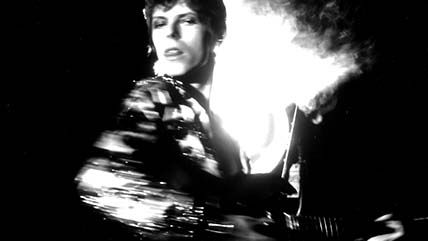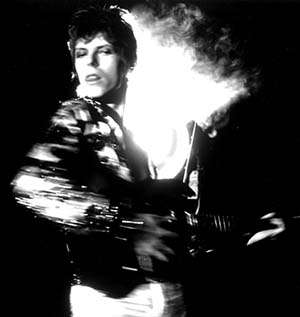David Bowie Was a Time Traveler from Our Hyper-Personalized Future
The star who made it cool to be a freak


David Bowie was weird, even for a rock star.
From his first burst of fame in the late 1960s, when he hit the big time with a song narrated by a barely-keeping-it-together astronaut, he acted like an emissary from our increasingly hyper-personalized future, goading us to try new and different looks, styles, and thoughts. By the time he died January 10 at the age of 69, we had pretty much caught up to him, which is as great a tribute as can be imagined. The world we live in is much less formal, buttoned-down, and uniform than it was before Bowie strutted onstage as the mythic rock star Ziggy Stardust, "with screwed-up eyes and screwed-down hairdo, like some cat from Japan."
Like Bob Dylan, Bowie was a relentless shape-shifter and a persona-generator. Where Dylan mostly veers back in time to become a hobo folkie, fire-and-brimstone preacher, and desiccated crooner (among other identities), Bowie always looked toward the science-fiction future. Over dozens of records and film and TV appearances, he was constantly evolving, mutating, and—maybe most important of all—obviously enjoying himself.
He was an Ovid, forever metamorphosing: from folkie David Jones (his given name) to space-rock weirdo to ambisexual glam monarch to soul man to Berlin degenerate to "Thin White Duke" to MTV pop master to elder rock god. He revealed his final iteration only days before he died, releasing Blackstar, an album that mixes jazz, hip hop, and 17th-century theater. (One track is called "Tis a Pity She Was a Whore.")
Some of the incarnations were much more successful than others—in the '80s, Richard Butler of the Psychedelic Furs slagged Bowie, with some justice, as "a boring old fart"—but the point isn't that they all worked. It's that he constantly tried different things yet managed to remain unmistakably Bowie. In this, he exemplified what the anthropologist Grant McCracken calls "plenitude": the quickening "speciation" of human social types. The postwar period and especially the last decades of the 20th century, McCracken argues, saw a vast profusion of the sorts of people walking the streets of our cities and towns.
"Teens," he wrote in 1997, "were once understood in terms of those who were cool and those who weren't. But in a guided tour of mall life a few years ago, I had 15 types of teen lifestyle pointed out to me, including heavy-metal rockers, surfer-skaters, b-girls, goths, and punks. Each of these groups sported their own fashion and listened to their own music. The day of the universally known Top 40 list is gone.
"Gender types are proliferating. Whole new categories of powerful, forthright femaleness have emerged, while 'maleness' is undergoing its own florescence. Gayness, which used to mean adhering to a limited number of public behavioral models, has rapidly subdivided into numerous subgroups. Many of these groups have developed their own literature, music, and even retail communities. They have become social worlds.
"New species of social life can form everywhere: around rock groups (Deadheads); football teams (Raider fans); TV series (Trekkies); leisure activities (line dancers); means of transport (Hell's Angels); sports (Ultimate Frisbee); movies (The Rocky Picture Horror Show); technology (geeks)."
These days, we're all mutants or cyborgs or trans in some way or another. And that's a good thing, especially if we, like Bowie, are directing our own personal evolution. If plenitude had an advance man, it was Bowie, whose playfulness was as insistent as it was daunting and endearing.
The first time I remember encountering his visage was in a TV Guide ad for a television appearance—or was it a full-blown special?—around the time his 1973 album Pinups was released. I would have been around 10 years old. Even today, with countless shows and movies built around androids, drag shows, celebrity sex tapes, and intensive inspections of human corpses, Pinups' cover image still feels freaky and beautiful in great and unsettling ways.
Sporting a shag that was ubiquitous among men and women at the time, Bowie stares straight at the viewer. A drowsy, 'luded-out person rests her (his?) face on the singer's shoulder. What the hell? Are those faces masks? If you removed them, would they reveal flesh and blood or high-tech circuitry? What exactly do the duo's unseen bodies, apparently naked, look like? Weird stuff for 1973, a year when unironic, maudlin songs like "Time in a Bottle" and "The Most Beautiful Girl" topped the charts.
When I showed the picture to my parents, who were born in the 1920s and stopped keeping up with popular music before Sinatra needed a comeback, they grimaced and shook their heads. If they weren't disgusted, it was because they couldn't even process the image. Back then, the typical TV Guide picture featured McGarrett from Hawaii Five-O or Mary Tyler Moore. Sonny & Cher was pushing the envelope.
As with most celebrities and creative types, Bowie wasn't always sharp when it came to discussing things beyond his core competencies of music and brilliant strangeness. In a notorious 1976 Playboy interview, he said, "I believe very strongly in fascism," called Hitler the "first rock star," and said he stood by everything he said "except the inflammatory remarks." He apologized for all this and more eventually, noting that he was not only young at the time (just 29) but usually coked up out of his mind. Later, he would say, "The more government systems I see, the less enticed I am to give my allegiance to any set of people."
In 1987, he returned to West Berlin, where he had made an exceptional set of records in the late 1970s, including several with his muse and protégé Iggy Pop. There he played a concert so loud it could be heard in communist East Berlin. The Internet abounds with footage from the show, which is capped by an absolutely brilliant version of "Heroes," his ballad of doomed lovers who literally meet in the shadow of the Berlin Wall to steal a moment ("I can remember standing by the wall, and the guns shot above our heads").
Just days after the concert, President Ronald Reagan also performed in Berlin, delivering one of his most memorable lines: "Mr. Gorbachev, tear down this wall." Who's to say that the example of Bowie, who personified not only the freedom of expression but the sybaritic desire that the Communists had unsuccessfully tried to stamp out, wasn't as important to the Wall's destruction as the arms race? The day after his death, the German government tweeted, "Good-bye, David Bowie…Thank you for helping to bring down the #wall."
Bowie was exceptionally well-read (his list of 100 favorite books ranges from Madame Bovary to The Gnostic Gospels) and was renowned for his knowledge of blues, folk, jazz, and experimental music. (He introduced U.S. audiences to the German avant garde perfomer Klaus Nomi on Saturday Night Live, of all venues.) Yet only fools look to celebrities and artists—especially rock stars—for moral instruction and political programs. We're wiser to seek artists for inspiration and ideas on how we might expand our own horizons and think about our own possibilities.
It's in this sense that Bowie was a time traveler from our own future, where we all feel more comfortable not just being who we are but in trying out different things to see whom we might want to become. Certainly, an entire species of performer, from U2 to Madonna to Lady Gaga to Jay-Z (who sampled "Fame" in his 2001 track "Takeover") were influenced by him.
And unlike many rock stars, Bowie created continuity with earlier forms of popular music, not only by covering various old songs ("Wild Is the Wind" is a memorable instance) but by incongruously appearing with Bing Crosby on der Bingle's 1977 Merrie Olde Christmas TV Special, which gave birth to Crosby and Bowie's enduringly beautiful and strange duet of "Peace on Earth/The Little Drummer Boy."
I have no memory of watching that show with my parents, but we must have seen it together, as they never missed a Bing special and there's simply no way I didn't watch Bowie on prime-time TV. The setup for the variety show is that Crosby is spending the holidays at the British castle of a distant relative; Bowie lives down the street, and the lord of the manor, "Sir Percival," lets him use his baby grand piano from time to time.
Not just worlds but whole galaxies collide when Bowie joshes through third-rate patter with Bing before sitting down and belting out a couple of tunes together. And what must my parents have thought when Bowie returned later in the show to perform "Heroes," replete with arty mime moves? I don't know what they were thinking, but I know I was never the same again.
This article originally appeared in print under the headline "David Bowie Was a Time Traveler from Our Hyper-Personalized Future."


Show Comments (11)